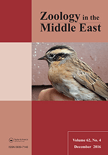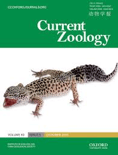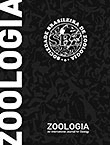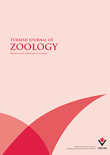
ZOOLOGY IN THE MIDDLE EAST
Scope & Guideline
Exploring the Rich Fauna of the Middle East
Introduction
Aims and Scopes
- Biodiversity Assessment:
The journal emphasizes documenting and assessing the biodiversity of the Middle East, with a strong focus on endemic and threatened species across various taxa. - Taxonomic Research:
Significant contributions are made towards the taxonomy of lesser-known or newly identified species, including detailed descriptions and morphological analyses. - Ecological Studies:
Research on ecological dynamics, habitat requirements, and behavioral adaptations of species in their natural environments is a core focus, providing insights into species interactions and ecosystem health. - Conservation Biology:
The journal publishes studies that evaluate conservation status, threats, and management strategies for various species and habitats, highlighting the importance of preserving biodiversity. - Genetic and Morphological Studies:
There is a consistent focus on genetic diversity and morphological characteristics, allowing for a deeper understanding of population structures and evolutionary relationships within and across species.
Trending and Emerging
- Molecular and Genetic Research:
There is a marked increase in studies utilizing molecular techniques to assess genetic diversity, phylogeography, and population structure, reflecting a trend towards integrating genetic data into ecological and conservation research. - Climate Change Impact Studies:
Recent publications have increasingly focused on the potential impacts of climate change on species distribution and biodiversity, highlighting the urgency of understanding these dynamics in the face of global environmental change. - Human-Wildlife Interaction:
The journal is seeing a rise in studies addressing human-wildlife interactions, including the effects of urbanization and human activities on wildlife ecology and behavior, which is crucial for effective conservation strategies. - Conservation Genetics:
Emerging research themes include conservation genetics, where genetic tools are applied to inform conservation efforts, particularly for endangered and endemic species. - Citizen Science Contributions:
There is a growing trend towards incorporating citizen science data in research, enhancing the scope of biodiversity monitoring and engagement with local communities in conservation efforts.
Declining or Waning
- Large-scale Ecological Modeling:
Research that involves large-scale ecological modeling and its applications in predicting species distributions has seen a reduction in recent publications, possibly due to a shift towards more localized and species-specific studies. - Invasive Species Management:
While initially a prominent theme, studies focusing on the management of invasive species have decreased, suggesting a potential shift towards understanding native species interactions instead. - Traditional Ethological Studies:
Papers detailing traditional behavioral studies of species in natural settings are less common, indicating a potential move towards more quantitative and molecular approaches to behavior.
Similar Journals

ACTA ZOOLOGICA BULGARICA
Advancing the Frontiers of Zoological ResearchACTA ZOOLOGICA BULGARICA is a prominent academic journal dedicated to advancing knowledge in the fields of Animal Science, Zoology, Aquatic Science, Ecology, Evolution, Behavior, and Systematics. Published by the Institute of Zoology, Bulgarian Academy of Sciences, this journal serves as an invaluable platform for researchers, professionals, and students to disseminate their findings and engage with contemporary issues in biodiversity and ecology. With an established history since its convergence in 2010 and an ongoing publication schedule through to 2024, the journal holds a Q4 category ranking in multiple disciplines, highlighting its role in fostering scholarly communication in these areas despite its recent entry into Scopus-indexed rankings. Although currently not an open-access journal, ACTA ZOOLOGICA BULGARICA remains a key resource for those interested in the latest research and developments, particularly within the ecological and zoological landscapes of Europe and beyond.

Redia-Journal of Zoology
Advancing zoological knowledge, one study at a time.Redia-Journal of Zoology, published by the CRA-Research Centre Agrobiology & Pedology in Italy, is a distinguished academic journal dedicated to advancing the field of zoological studies through high-quality research and insightful reviews. With an ISSN of 0370-4327, this journal provides a platform for scholars and practitioners in the Agricultural and Biological Sciences to disseminate their findings and engage in meaningful discourse. Recognized in the 2023 Scopus rankings as Q2 in its category, Redia occupies a notable position within the global research community, ranked 138 out of 221 in Agricultural and Biological Sciences. The journal has a commitment to publishing original research from 2011 until 2024, contributing to the body of knowledge in diverse sub-disciplines of zoology, ecology, and conservation. While currently not open access, Redia strives to foster collaboration and discussion among researchers, making it a vital resource for advancing zoological sciences.

BELGIAN JOURNAL OF ZOOLOGY
Fostering Knowledge and Discovery in Zoology.The BELGIAN JOURNAL OF ZOOLOGY, published by the Royal Belgian Zoological Society, serves as a prominent platform for advancing research in the field of zoology. With an impact factor reflecting its status within the academic community, this journal rigorously publishes innovative studies and reviews, covering a broad spectrum of topics related to animal science and zoology. As an esteemed outlet, the journal ranks in the Q2 category for both Animal Science and Zoology, demonstrating its relevance and contribution to the field, as indicated by its Scopus ranking of 255 out of 490. Although it operates under a subscription model, the journal is committed to disseminating high-quality research that can shape contemporary understanding of animal biology and ecology. With a publication history dating back to 1990 and extending through 2024, researchers, professionals, and students are encouraged to engage with its rich content, which is vital for ongoing discourse and discovery within zoological sciences.

Check List
Exploring the frontiers of animal and plant science.Check List is a distinguished open-access journal published by PENSOFT PUBLISHERS, dedicated to advancing the fields of Animal Science, Zoology, Ecology, and Plant Science. Since its inception in 2006, the journal has provided a platform for the dissemination of significant research findings, fostering global collaboration among scientists and researchers. The journal’s impact is evident, securing a Q3 ranking in multiple environmental and biological science categories for 2023, thereby affirming its role in enriching scientific literature in these domains. With a converged publication span from 2010 to 2024, Check List maintains a commitment to accessibility and transparency in research, making important contributions to knowledge in ecology and biodiversity. By reaching a diverse readership including professionals, researchers, and students, Check List exemplifies a vibrant forum for academic discourse. The journal's base in Brazil positions it uniquely to highlight regional research while embracing a broader international perspective.

Current Zoology
Transforming Understanding of Animal LifeCurrent Zoology, published by Oxford University Press, is a leading open-access journal dedicated to advancing the field of zoology and animal science since its establishment in 2009. With an impressive Q1 ranking in Animal Science and Zoology as of 2023, the journal maintains a prominent position within the academic community, supported by a ranking of #138 out of 490 in Scopus. Current Zoology serves as a vital platform for researchers, professionals, and students, showcasing high-quality research that spans a broad array of topics within the domain of zoology. This journal is characterized by its rigorous peer-review process, ensuring the dissemination of credible and impactful findings that contribute to the understanding of animal biology and conservation efforts. The open-access model enhances accessibility, allowing a wider audience to engage with the pivotal research being conducted in this dynamic field. Processing all manuscripts in an efficient manner and featuring articles that push the boundaries of current knowledge, Current Zoology is your gateway to explore innovative discoveries and trends in zoology.

KEW BULLETIN
Fostering Knowledge in Plant and Ecological SciencesKEW BULLETIN is an esteemed academic journal dedicated to the fields of plant science and ecology, published by SPRINGER LONDON LTD. With an ISSN of 0075-5974 and E-ISSN 1874-933X, it has been a significant resource for researchers and scholars since its inception in 1993, currently covering converged years up to 2024. The journal holds a notable position with a 2023 category quartile ranking of Q3 in Ecology, Evolution, Behavior and Systematics and Q2 in Plant Science, highlighting its contributions to advancing knowledge in these critical areas. Its Scopus ranks—#333 in Plant Science and #475 in Ecology, showcasing a percentile rank of 35th and 34th respectively—further authenticate its standing among peers. While KEW BULLETIN is not an open-access publication, it offers valuable research findings, insightful reviews, and fosters academic discourse, making it an essential platform for professionals, students, and researchers passionate about understanding the intricacies of plant life and ecological systems. Located at 236 Grays Inn Rd, 6th Floor, London WC1X 8HL, England, the journal remains committed to disseminating high-quality research and supporting the scientific community.

GAYANA
Exploring the depths of Animal and Aquatic research.GAYANA is a pioneering journal in the fields of Animal Science and Zoology and Aquatic Science, published by EDICIONES UNIV, CONCEPCION in Chile. With an ISSN of 0717-652X and an E-ISSN of 0717-6538, this journal has been at the forefront of research dissemination since its inception in 2006. Recognized in 2023 with a Q4 quartile ranking in both its categories, GAYANA provides a platform for researchers and practitioners alike to explore and publish their findings. Despite its relatively new establishment, the journal has carved a niche in aquatic and animal research, as evidenced by its Scopus ranks in the 12th and 7th percentiles, respectively. With challenges in access options, GAYANA emphasizes the significance of open scholarly communication, fostering an academic environment where knowledge is shared and advanced. Contributing to GAYANA means being part of a growing community dedicated to understanding and conserving our natural world.

Journal of Vertebrate Biology
Fostering academic discourse on vertebrate evolution.Journal of Vertebrate Biology, a reputable publication established by the Institute of Vertebrate Biology in the Czech Republic, serves as a vital platform for research across the fields of Animal Science and Zoology, Aquatic Science, and Ecology, Evolution, Behavior and Systematics. With its ISSN 2694-7684 and a commendable 2023 Q2 ranking in multiple categories, this open-access journal embraces innovative scientific inquiry and fosters academic discourse. The journal's commitment to disseminating high-quality research is reflected in its Scopus rankings, positioning it within the top quartile in several impactful areas. As it continues to converge its focus until 2024, researchers, professionals, and students alike are encouraged to engage with cutting-edge studies that advance our understanding of vertebrate biology. This publication stands out not only in its scholarly contributions but also in enhancing global awareness of biodiversity and conservation issues.

Zoologia
Fostering Collaboration for Wildlife ConservationZoologia, published by the SOC BRASILEIRA ZOOLOGIA and UNIV FEDERAL PARANA, is a premier open-access journal dedicated to the field of zoology and related disciplines. Established in 2009 and based in Brazil, this journal has quickly positioned itself as a vital resource for researchers, professionals, and students, providing a platform for innovative research and comprehensive reviews in animal science and zoology. With an H-index indicative of its growing citation impact and a current Scopus ranking placing it in the 46th percentile of its category, Zoologia focuses on increasing the visibility and accessibility of cutting-edge zoological research. The journal aims to advance the understanding of animal biology, ecology, and conservation, making it an essential read for those invested in animal science. As an open-access publication, it ensures that knowledge dissemination is unrestricted, fostering a collaborative scientific community striving towards impactful conservation and biodiversity initiatives.

TURKISH JOURNAL OF ZOOLOGY
Elevating Standards in Zoological ResearchThe TURKISH JOURNAL OF ZOOLOGY, published by the esteemed Tubitak Scientific & Technological Research Council Turkey, serves as a pivotal platform for the dissemination of research in the field of zoology and animal science. With an ISSN of 1300-0179 and an E-ISSN of 1303-6114, this journal has been contributing to the scientific community since its inception in 1994 and will continue to do so through 2024. Renowned for its scientific rigor, the journal holds a Q3 ranking in the 2023 category of Animal Science and Zoology, placing it within the prominent ranks of Scopus with a current percentile of 56, and an overall rank of 214 out of 490 in its domain. As an essential resource for researchers, professionals, and students, the journal prioritizes quality research, fostering knowledge exchange and collaboration among scholars worldwide. With its commitment to advancing understanding in zoological sciences, the TURKISH JOURNAL OF ZOOLOGY stands as a significant contribution to the global scientific dialogue.